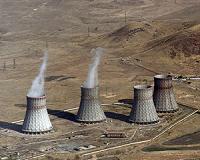 |
Berlin (AFP) March 14, 2011 Fears of a nuclear disaster in Japan prompted Germany on Monday to put on ice extending the lifespan of its nuclear power plants, pending a safety review. "We cannot just go back to business as usual," Chancellor Angela Merkel told reporters in Berlin. "Events in Japan... teach us that risks that were thought to be completely impossible cannot in fact be completely ruled out." She announced a three-month moratorium on government plans approved last year to postpone by more than a decade until the mid-2030s when the last of the 17 nuclear reactors in Europe's biggest economy are turned off. Environment Minister Norbert Roettgen said that during the moratorium the plug would be pulled from reactors -- the oldest has been running for 35 years -- which would have been switched off if there hadn't been an extension. "Personally I expect that (the reactors) taken out of the network during the moratorium will not go back on line," Roettgen said. Explosions have rocked two overheating nuclear reactors at Japan's ageing Fukushima plant, 250 kilometres (160 miles) northeast of Tokyo, after the cooling systems were knocked out by Friday's 8.9-magnitude quake. "If a highly developed country like Japan, with high safety standards and norms, cannot prevent the consequences for nuclear power of an earthquake and a tsunami, then this has consequences for the whole world," Merkel said. "This changes the situation, including in Germany. We have a new situation, and this situation must be thoroughly analysed.... Reviewing security, there can be no taboos." Under Merkel's predecessor Gerhard Schroeder, Germany decided a decade ago to go nuclear-free by 2020, but after being re-elected to a second term in late 2009 Merkel postponed the switch-off last year. Merkel says that the extension is necessary because green technologies like solar and wind power are not yet ready to fill the gap left by abandoning atomic energy. But nuclear power is highly unpopular in environmentally conscious Germany, with shipments of radioactive waste regularly attracting angry protests, and the extension is opposed by a majority of voters, surveys have shown. Campaigners, many of whom say the extension is more about generating extra profits for energy firms than the environment, have announced vigils around Germany for Monday, including outside Merkel's chancellery. Shares in German power firm EON slumped 5.26 percent on Monday, while rival RWE lost 4.77 percent. In the latest mass demo, tens of thousands formed a 45-kilometre (28-mile) human chain between a nuclear plant and Stuttgart on Saturday. The demo was planned beforehand, but events in Japan swelled numbers. It took place in the southwestern state of Baden-Wuerttemberg, where on March 27 Merkel's Christian Democrats (CDU) face losing power after 58 years in charge, in the most important of seven state elections this year. The Social Democrats (SPD) in Baden-Wuerttemberg have vowed to switch off the state's two oldest nuclear power stations by 2020 if they win the election. Polls suggest a tight race. On Monday the opposition piled the pressure on Merkel, with SPD head Sigmar Gabriel saying that being in a zone with a low risk of earthquakes did not make Germany's nuclear power plants totally safe. "People are making the mistake a bit in the current debate of seeing the earthquake (in Japan) as the problem. The problem is the power cut," he said. Merkel was due on Tuesday to meet premiers from the German states where there are nuclear plants to discuss plant safety.
Share This Article With Planet Earth
Related Links Nuclear Power News - Nuclear Science, Nuclear Technology Powering The World in the 21st Century at Energy-Daily.com
 Nuclear contamination: The options
Nuclear contamination: The optionsParis (AFP) March 13, 2011 Evacuation, temporary shelter and iodine pills are the chief weapons for protecting civilians against nuclear fallout, experts say. A blast on Saturday that wrecked the concrete shell surrounding the No. 1 reactor at Japan's Fukushima nuclear plant released radioactive vapour but not at levels dangerous for human health, according to Japanese officials. Specialists say the authorities ha ... read more |
|
| The content herein, unless otherwise known to be public domain, are Copyright 1995-2010 - SpaceDaily. AFP and UPI Wire Stories are copyright Agence France-Presse and United Press International. ESA Portal Reports are copyright European Space Agency. All NASA sourced material is public domain. Additional copyrights may apply in whole or part to other bona fide parties. Advertising does not imply endorsement,agreement or approval of any opinions, statements or information provided by SpaceDaily on any Web page published or hosted by SpaceDaily. Privacy Statement |